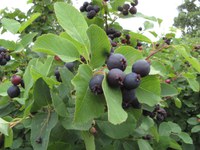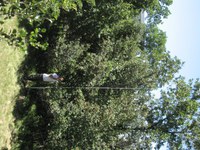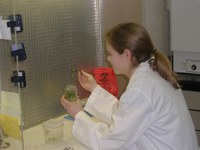NDSU Juneberry Search Continues
(Click an image below to view a high-resolution image that can be downloaded)
North Dakota State University’s search continues for Juneberry plants that could be the start of new commercial varieties.
NDSU plant researchers began last year to look for individual plants that are consistent producers of abundant, good-tasting fruit. Other characteristics that ideal plants should have include easy-to-pick berries, dense branching on short (less than 16 feet tall) plants and resistance to insects and diseases. The researchers plan to concentrate their search in western North Dakota this year.
The researchers are hoping to develop U.S.-based varieties that can be sold commercially because most of the varieties on the market come from Canada.
Although Juneberry production is a small industry in North Dakota, it is growing. Some orchards allow the public to pick berries. At others, the growers pick the fruit and sell fresh or frozen berries to the public or processors. Juneberries are processed commercially into jams, jellies, syrup, pies and ice cream flavoring.
In 2007, the first year of the search, the researchers identified 17 specimens for further evaluation, according to Joe Zeleznik, NDSU Extension Service forester and a member of the Juneberry project team.
That number considerably exceeded the researchers’ expectations.
“We were hoping to identify a minimum of five plants for further evaluation,” Zeleznik says.
Seventy-two people from throughout the state contacted the researchers with information on plants that might fit the criteria, says Jim Walla, another member of the Juneberry project team and a research associate in the NDSU Plant Pathology Department.
Last summer, Walla and an assistant visited 31 sites and checked out more than 900 plants. They conducted full evaluations of 33 plants at 18 sites.
“They rated the berries in 40 different characteristics and found a lot of variation,” Zeleznik says.
This past winter, another team member, Harlene Hatterman-Valenti, an associate professor in the NDSU Plant Sciences Department, began propagating the plants chosen for further review. She will plant them in a test plot this spring.
The researchers say they hope to find a minimum of five plants from western North Dakota to put through the propagation and test plot evaluation, but more would be great.
“We want as many superior plants as we can get,” Walla says.
The researchers are looking for the public’s help because people who have picked Juneberries for several years sometimes find plants that are much better than average. The researchers encourage people to report such plants growing on property belonging to them or a friend, as well as on public land.
Any plant that meets the criteria could become the basis for a new release as long as it’s not already a named cultivar.
If a plant eventually is released as a commercial variety, the people who identified it will be able to help name the cultivar. They’ll also receive a reward, such as a percentage of the royalties from the variety’s sales.
But don’t expect to see a new variety out anytime soon. Developing a new cultivar usually takes about 10 years. Getting it to just the fruit-bearing stage takes at least three years, Hatterman-Valenti says.
The researchers don’t know how many new varieties might result from their efforts.
“There is really no formula to guide us in how the selection process will go to yield released varieties,” Walla says. “I would guess that 25 percent to 50 percent, or about four to nine, of those selected in 2007 could be in the running for eventual release, and half of those might actually be released.”
To report a plant or plants, contact Hatterman-Valenti at (701) 231-8536 or h.hatterman.valenti@ndsu.edu, Walla at (701) 231-7069 or j.walla@ndsu.edu or Zeleznik at (701) 231-8143 or joseph.zeleznik@ndsu.edu.
NDSU Agriculture Communication
| Source: | Joe Zeleznik, (701) 231-8143, joseph.zeleznik@ndsu.edu |
|---|---|
| Editor: | Ellen Crawford, (701) 231-5391, ellen.crawford@ndsu.edu |




